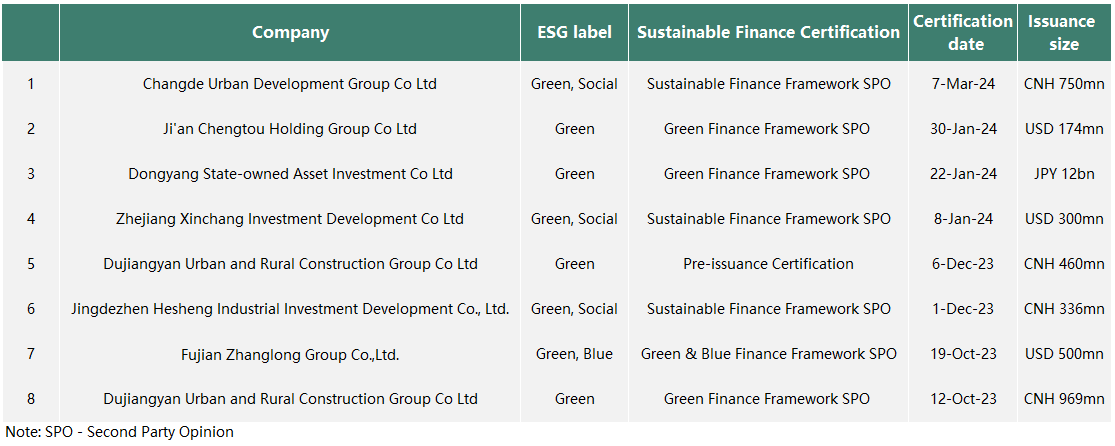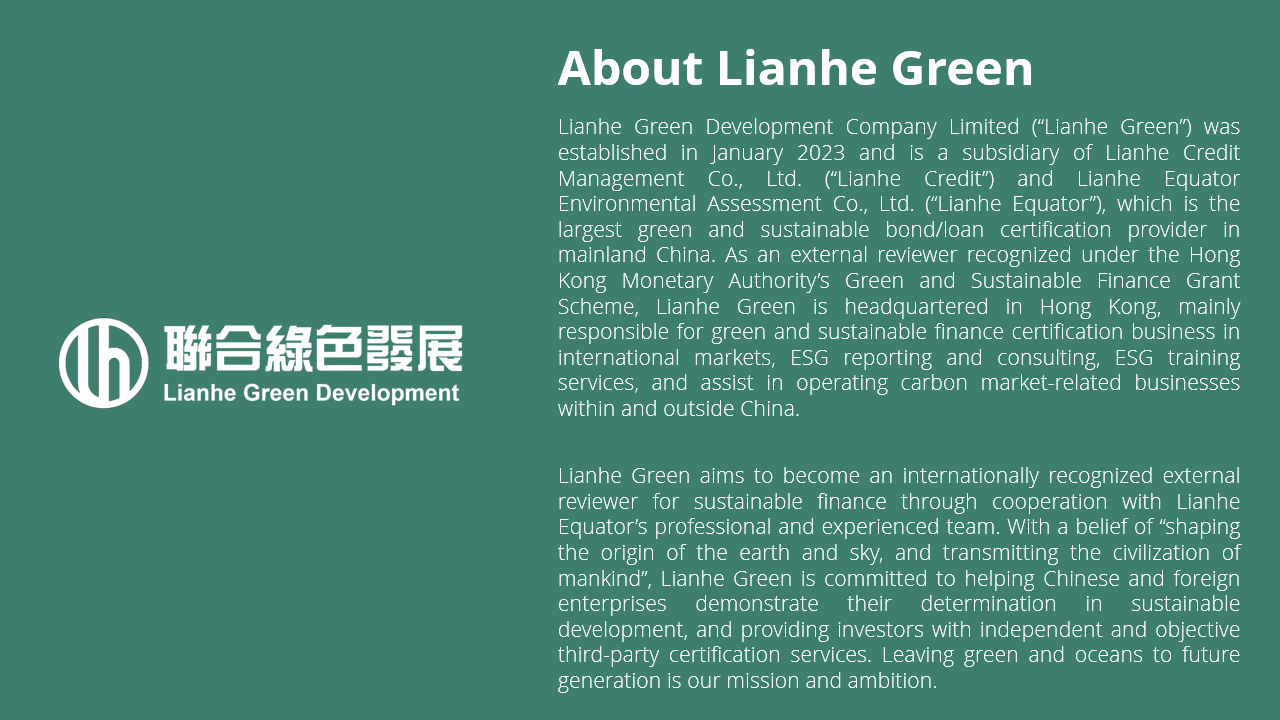 return
return
 current location:Home
current location:Home
 News and Events
News and Events
 News and Events
News and Events
 【ESG News】Global Trends Biweekly Newsletter Issue 6 (2024.4.22-2024.5.3)
【ESG News】Global Trends Biweekly Newsletter Issue 6 (2024.4.22-2024.5.3)
 return
return
 current location:Home
current location:Home
 News and Events
News and Events
 News and Events
News and Events
 【ESG News】Global Trends Biweekly Newsletter Issue 6 (2024.4.22-2024.5.3)
【ESG News】Global Trends Biweekly Newsletter Issue 6 (2024.4.22-2024.5.3)
category:News and EventsRelease time:2024-05-06

Hong Kong China ESG trends
HKMA published the Hong Kong Taxonomy for Sustainable Finance (Hong Kong Taxonomy) to facilitate green finance flows
3 May - The Hong Kong Monetary Authority (HKMA) published the Hong Kong Taxonomy for Sustainable Finance (Hong Kong Taxonomy) to enable informed decision making on green and sustainable finance and facilitate relevant finance flows. HKMA encourages the financial sector to use the Hong Kong Taxonomy to assess the greenness of projects and assets when labelling and developing products, as well as making disclosures. For the next step, the HKMA will seek to expand the coverage of the taxonomy to include more sectors and activities, including transition activities. The consultation report is an update to last year's consultation, updates include the inclusion of LEED in the green building rating schemes and the inclusion of co-digestion facilities.
Source: HKMA (https://www.hkma.gov.hk/eng/news-and-media/press-releases/2024/05/20240503-3/)
HKMA officially announced to extend the Green and Sustainable Finance Grant Scheme for three years, effective from May 10 2024
The Hong Kong Monetary Authority (HKMA) announced on 3 May the extension of the Green and Sustainable Finance Grant Scheme (Grant Scheme) and expanded the scope of subsidies to cover transition bonds and loans. The move is intended to further promote the sustainable development of Hong Kong's financial markets and support companies in their transition to greener and more sustainable business models.
Specific adjustments include:
1. The applicable taxonomies now include the Hong Kong Taxonomy for Sustainable Finance published on the same day.
2. The grant scheme has been extended to transition bonds and loans issued on or after May 10, 2024 that meet additional criteria, including: i) a developed and appropriately disclosed transition plan; ii) pre-issuance external review demonstrating the adoption of internationally-recognised transition finance principles, standards or guidance; iii) for use-of-proceeds instruments, pre-issuance external review demonstrating alignment with an applicable internationally-recognised taxonomy, as provided by a recognised external reviewer.
3. In the new grant scheme, 1) a new definition of the general bond issuance costs has been added to the first-time transition bond issues, 2) For external review costs, the total amount of grant for each eligible bond/loan remains at HK $800,000, but the specific amount and requirements of the external review service fee before and after the issuance have been specified in more detail.
Source: HKMA (https://www.hkma.gov.hk/eng/news-and-media/press-releases/2024/05/20240503-9/)
International ESG trends
EU Approves 2 Year Delay to Sustainability Reporting Standards for Specific Sectors and non-EU Companies
EU member states in the European Council announced that they have approved a directive delaying the adoption of standards for companies to provide sector-specific sustainability disclosures and for sustainability reporting from companies outside of the EU under the Corporate Sustainability Reporting Directive (CSRD).
Source: ESG Today (https://www.esgtoday.com/eu-approves-2-year-delay-to-sustainability-reporting-obligations-for-specific-sectors-and-non-eu-companies/)
IFRS, EFRAG Publish Guide for Companies Complying with Both ISSB and CSRD Sustainability Reporting Standards
The IFRS Foundation and the European Financial Reporting Advisory Group (EFRAG) announced today the publication of the ESRS-ISSB standards interoperability guidance, a new document aimed at illustrating the high level of alignment between the sustainability reporting standards recently issued by IFRS’ International Sustainability Standards Board’s (ISSB) and the European Sustainability Reporting Standards (ESRS).
Source: ESG Today (https://www.esgtoday.com/ifrs-efrag-publish-guide-for-companies-complying-with-both-issb-and-csrd-sustainability-reporting-standards/)
Mainland China ESG trends
Guidance on Promoting High-quality Development of Green Insurance issued by the National Financial Regulatory Administration
Beijing, April 25 According to the official website of the National Financial Regulatory Administration, in order to give full play to the important role of insurance in promoting the comprehensive green transformation of economic and social development, the National Financial Regulatory Administration recently issued the "Guiding Opinions on promoting the high-quality development of green insurance" (hereinafter referred to as the "Guiding Opinions").
The "Guiding Opinions" mainly includes five parts and 24 measures. It puts forward clear requirements from five aspects: overall requirements, strengthening green insurance protection in key areas, strengthening green investment support of insurance funds, strengthening green insurance operation and management ability support and job security.
Source: People’s Daily (http://finance.people.com.cn/n1/2024/0425/c1004-40224009.html)
The National Energy Administration has publicly solicited comments on the "Renewable Energy Green Power Certificate Issuance and Trading Rules (Draft)"
According to the website of the National Energy Administration, in order to further regulate the issuance and trading of renewable energy green electricity certificates (GEC) and safeguard the legitimate rights and interests of all parties, the National Energy Administration has drafted the "Renewable Energy Green Electricity Certificate Issuance and Trading Rules (Draft for Comment)" (hereinafter referred to as the "Rules"), which is now open to the public for comment.
According to the "Rules", the green certificate is the only proof of the environmental attributes of China's renewable energy power, and the only certificate for identifying the production and consumption of renewable energy power. Green certificate issuance and transaction should adhere to the principles of "unified issuance, open transaction, market competition, information transparency, and traceability", the issuance of green certificates should be organized by the state, the transaction should be open to the society, the price should be formed by market-oriented means, the information disclosure should be timely and accurate, and the data of the whole life cycle should be authentic, tamper-proof, and traceable. The Rules apply to the issuance, trading and related management of green certificates for renewable energy power generation projects such as wind power, solar power generation, conventional hydropower, biomass power generation, geothermal power generation and ocean power generation produced in China.
Source:China Economic Net (http://www.ce.cn/cysc/stwm/gd/202405/06/t20240506_38992561.shtml)
Sustainable Finance Certification Public and Completed by Lianhe Green



